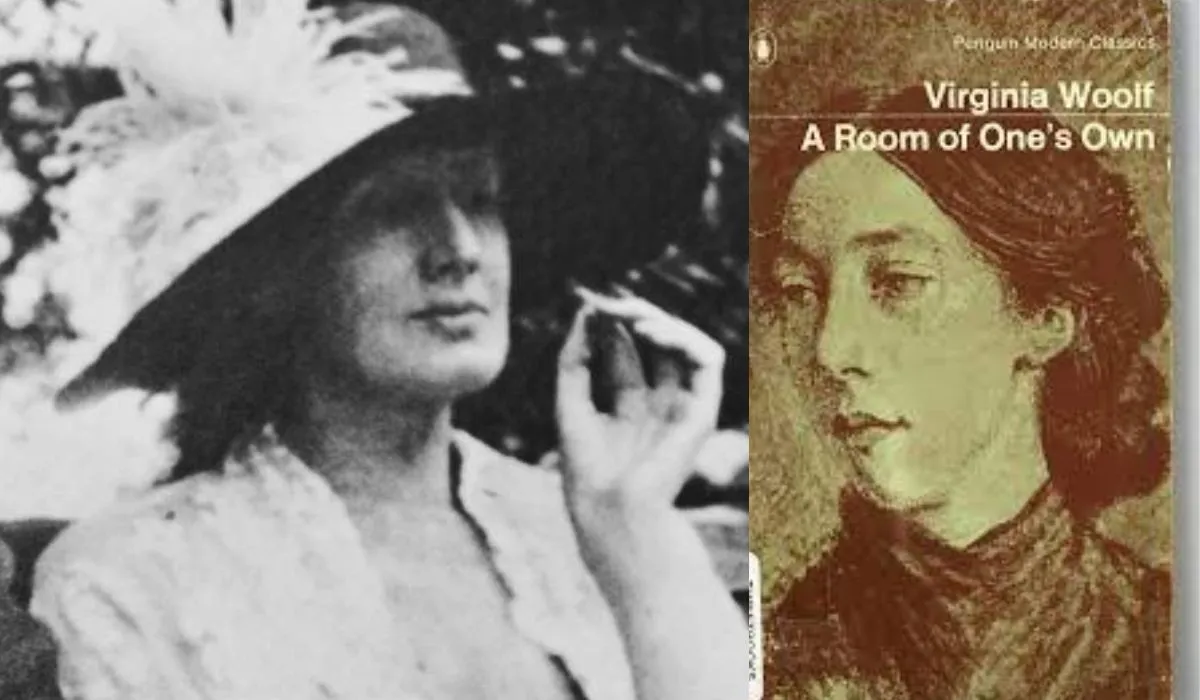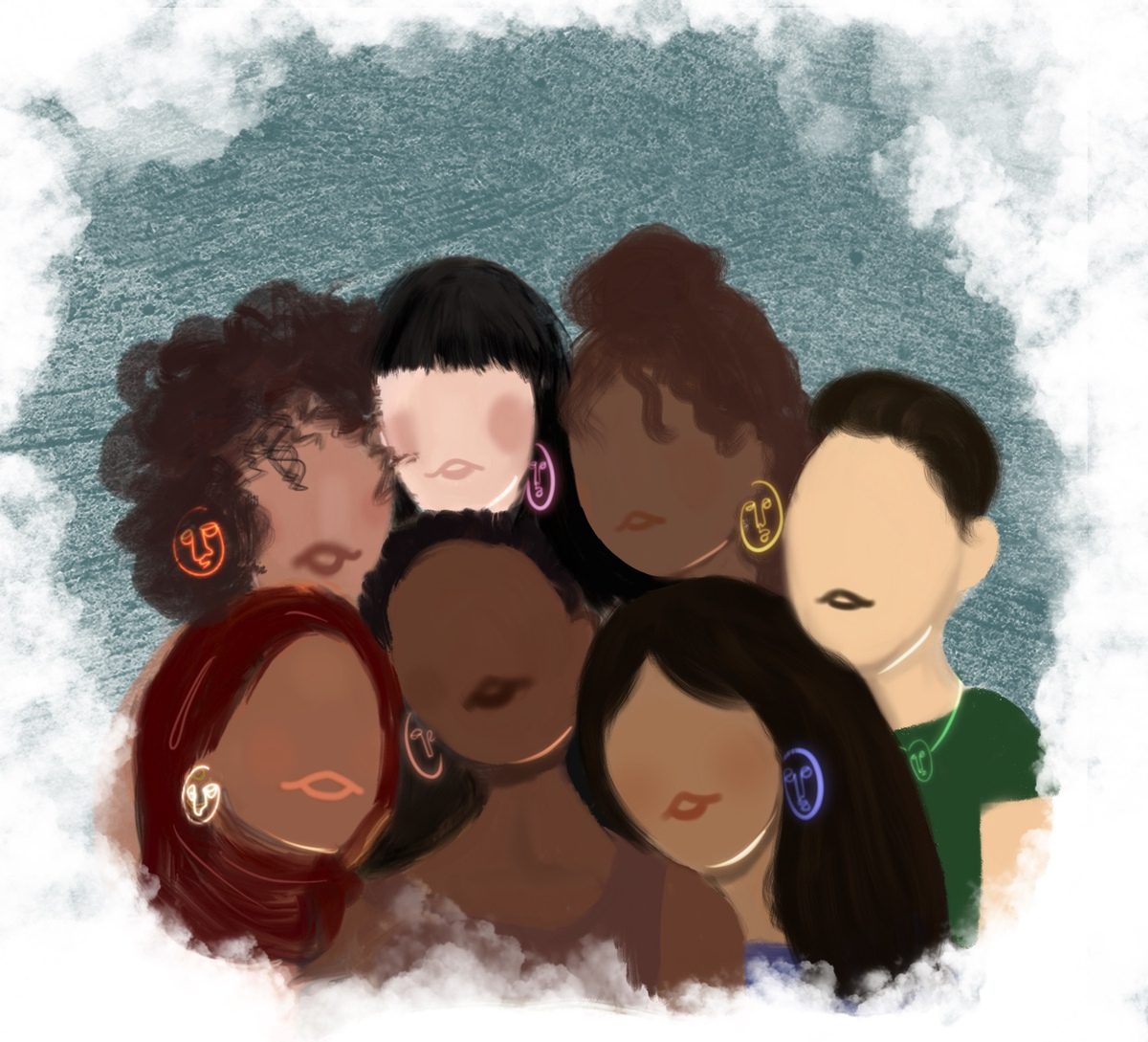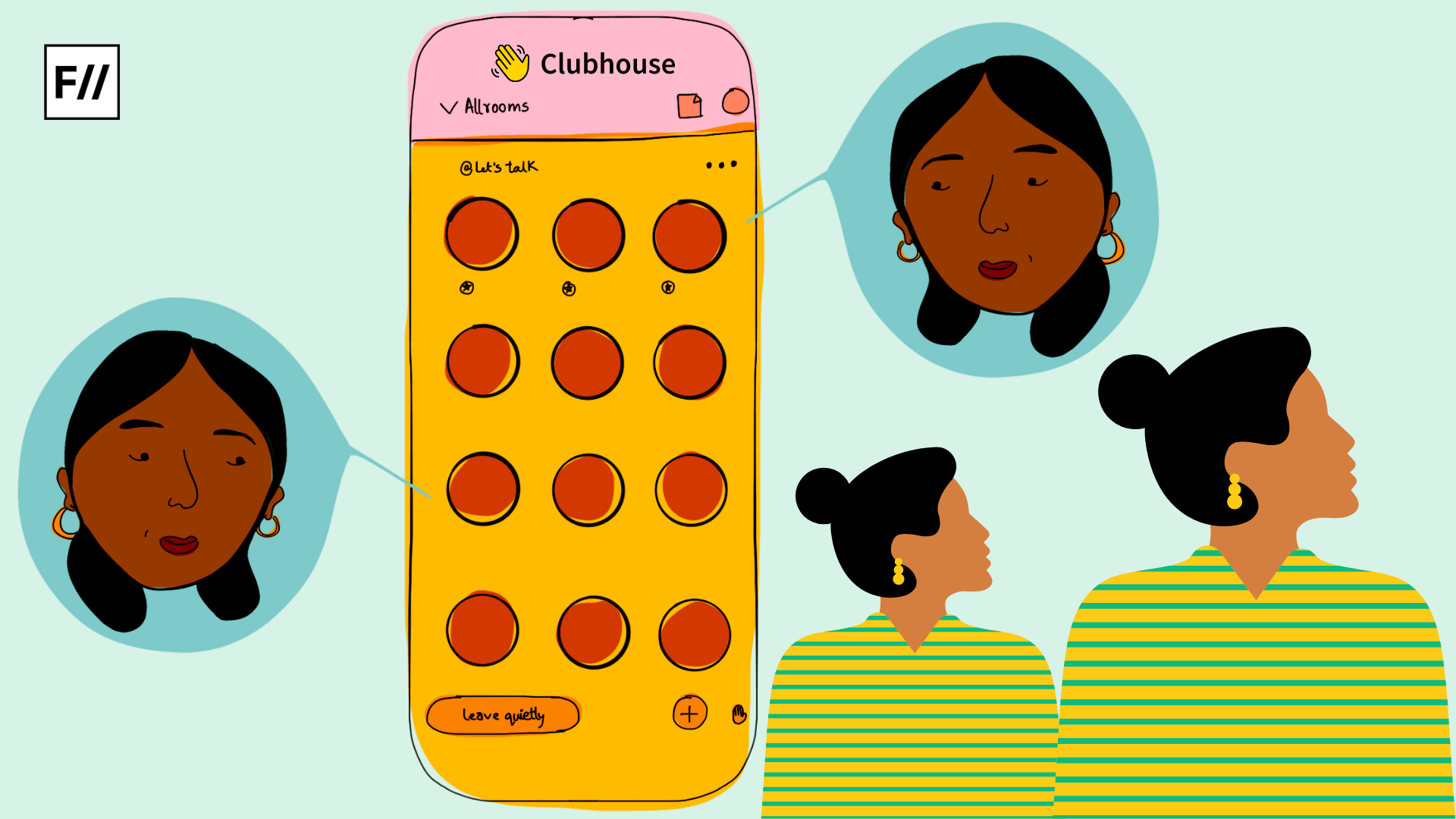Editor’s Note: FII’s #MoodOfTheMonth for August, 2021 is Digital Realities. We invite submissions on the many layers of experiences from the virtual world throughout the month. If you’d like to contribute, kindly email your articles to sukanya@feminisminindia.com
Clubhouse, a social audio app launched in March, 2020 has gained increasing popularity among users. Clubhouse began as a social media start up and was originally envisioned to be an app for podcasts under the name “Talk Show”. It was then rebranded as Clubhouse and launched for the iOS operating system last year.
In May 2021, Clubhouse was made available to Android users. Initially, joining Clubhouse was only permitted by invitation, but since July 2021, the app is accessible to everyone.
/cdn.vox-cdn.com/uploads/chorus_image/image/69292987/1232816107.0.jpg)
Clubhouse allows users to participate in real time, live chat rooms via audio. The pandemic induced cut down of social interactions led to the rapid use and popularity of Clubhouse. People and organisations from all backgrounds were quick to tap in to the potential of the app to conduct debates and discussions of various kinds.
The most defining feature of Clubhouse is that the platform permits the creation of chat rooms based on any topic, where the discussion can be moderated by the admins. This has given people, especially women and members of the LGBTQIA+ community more autonomy and agency to conduct, participate in, and moderate conversations on topics that are often stigmatised or sidelined by other mainstream media.
Agency and autonomy to marginalised groups
Our public spaces have always been limited in access to women, oppressed castes and members of the LGBTQIA+ communities. Spaces like road-side tea stalls, bus stands, parks, public gatherings and the like, where people exchange conversations have been traditionally designated as “male” spaces, because women and other genders have conservative mandates that limit social interactions.
Discussions on television channels also are limited to their respective hosts and panelists, predominantly men. The presence of women, queer individuals and oppressed communities on these forums are inadequate in representation and agency. The significance of a platform like Clubhouse in this context anchors itself on the autonomy and agency it provides to these groups.
Further, Clubhouse facilitates what other mainstream forums often neglect – re-constructing homogenised gender narratives. Gender narratives refer to the representation of the effects of various intersectionalities on one’s lived experience and performance of gender in the society.
Even as we acknowledge the need for equality, subjective differences in the social, political and emotional realities of the genders must be accounted for. Therefore, she considered re-authoring women’s narratives by women themselves as a radical, feminist act of resistance

Most of our social commentaries on gender are written and controlled by men. Therefore, the representation of women and their performance of gender are also informed by the male perspective of them. This extends to the representation of the queer community, as well as the marginalised castes, because for most of history, social narratives have been manufactured and streamlined by heterosexual men from dominant religions and castes.
Author and literary critic Virginia Woolf in her essay “A Room of One’s Own”, elaborates that the existing systems condition women to read about the world, and their place in it through men’s perspectives and women thereby internalise the aesthetics, politics and values created by men within the patriarchal system.
Also read: Virginia Woolf And Her Plea For A Room Of One’s Own
Women imbibe these ideas as the only, universal representations of life and themselves. This homogeneity is what Woolf attempted to break through re-authoring women’s narratives by stressing on the need for women themselves to tell their stories.

Feminist theorist and existentialist philosopher Simone De Beauvoir also aligns to Woolf’s observations of gender and narratives. In her book “The Second Sex”, she explains the need to acknowledge the difference in the lived realities of men and women, even as we advocate equality of the sexes.
Classical philosopher Plato bases his contentions of gender equality on the premise that sex is an accidental quality, and both men and women are qualified to be members of the guardian class. But in order for a woman to be accepted at par with a man, he insisted that she must prove herself to be as trained as a man. Thus, only men or those who imitate their so-called qualities were permitted to rule or take up social space, according to Plato.
Simone De Beauvoir criticises this point of view by reiterating that equality does not mean being alike, or identical. Even as we acknowledge the need for equality, subjective differences in the social, political and emotional realities of the genders must be accounted for. Therefore, she considered re-authoring women’s narratives by women themselves as a radical, feminist act of resistance.

The autonomy and agency a platform like Clubhouse gives women, members of the queer community, and individuals oppressed on the basis of caste, are particularly relevant when we juxtapose them with the concept of re-authoring narratives. Clubhouse presents the opportunity for individuals to create counter-narratives informed by experience. These accounts are thereby more representative of gendered and marginalised realities sans appropriation.
The everyday lives of the marginalised are narrated through casteist, misogynous cultural meta-narratives, and re-authoring them is crucial to create alternative self-narratives based on experiential truths.
Double edged sword
The same feature that makes Clubhouse unique is also the one that distorts relevant conversations without any basis. There are quite many rooms constituted and moderated by self-proclaimed “meninists”, “incels” and “anti-feminists”, who conduct discussions equating feminism to misandry.
Feminism is an evolving theory like any other, and it is not immune to critical engagement. But the problem arises when Clubhouse rooms are formed and streamlined with the objective to attack feminism with mansplaining and whataboutery. Such organised, anti-feminist conversations turn Clubhouse rooms into eco-chambers where the entire discussion is streamlined to suit the opinions of the moderators, without any space for democratic rebuttal.
What can be understood from this is that the sexism, misogyny, casteism and other biases that we harbour as a society are reflected in multiple proportions on virtual platforms like Clubhouse. Feminism continues to be maimed with hypermasculine narratives that suit the convenience of male privilege. Members of marginalised communities face alienation and bullying just like they do in physical spaces
Clubhouse user Namita Kumar says, “In a clubhouse room hosted by men against feminism, I was interrupted by one of the moderators for having a differing opinion, muted from speaking and eventually removed arbitrarily from the speaker’s list. Many women I know also have had similar experiences. The way they approach the topic is extremely toxic and I feel triggered and tired of them.”

Ponnu Babu feels traumatised at the thought that so many young, impressionable people join these rooms and spew hatred towards women with feminist affinities. She says, “It was such a horrible experience that I uninstalled Clubhouse”.
“I once listened to a Clubhouse room with a title that described feminism with an expletive. The confidence with which they spoke about feminism without any research or backing, other than their bruised egos was very triggering for me. I stopped listening to Clubhouse rooms that day”, says Aleena George.
Gowri shares another harrowing episode of being bullied by anti-feminists on Clubhouse. “I had created a public Clubhouse room to wish my friend on her birthday. A few men started bullying me and asked me to explain why I had ‘Feminist’ in my Clubhouse profile description. From where do these men get the audacity to assume that women owe them explanations for our feminist choices?”, she asks.

Athira Arunkumar says she has been in quite many homophobic and transphobic Clubhouse rooms, and was not even accepted as a speaker by the moderators when she tried to participate. Athira Mohan also testifies that most Clubhouse rooms become eco-chambers, hijacked by cisgender, heterosexual men who simply refuse to pass the mic to women, queer individuals or the Dalit, Bahujan, Adivasi community.
The very space that facilitates counter narratives is also used to control them and teach women and other marginalised groups to stay within their designated social roles. They are gaslit, threatened and sometimes hunted down on other social media applications for their Clubhouse opinions.
Reflections of inherent bias
Clubhouse has been under the scanner for its privacy flaws and lack of minimum age limit for users. Children and young teenagers participate in live proposal sessions and rooms that discuss sexually explicit content. The emergence of fake profiles and the presence of online predators who trick impressionable users into sharing their private details, make teenagers and children easy targets of potential abuse.
A concern that the law enforcement authorities raise about Clubhouse is that the application will start recording the audio in a chat room only if a user in that room reports abuse. Therefore, in the wake of an investigation, no evidentiary records may be available unless a user has reported abuse in a Clubhouse room.
What can be understood from this is that the sexism, misogyny, casteism and other biases that we harbour as a society are reflected in multiple proportions on virtual platforms like Clubhouse. Feminism continues to be maimed with hypermasculine narratives that suit the convenience of male privilege. Members of marginalised communities face alienation and bullying just like they do in physical spaces.
This kind of hate stems from our inherent, patriarchal, feudal morality. We still have a long way to go before we learn to criticise with objectivity, hold space and handle the unfettered possibilities of platforms like Clubhouse with empathy and responsibility.
Also read: Viral Culture: The Toxic, Invasive Trend Of Online Trolling
Featured Image: Ritika Banerjee for Feminism in India
About the author(s)
Sukanya is a lawyer-turned-journalist with experience in writing, editing, development communication, and advertising. She holds a graduation in law, a post-graduation in philosophy, and a post-graduate diploma in print journalism. She is also a published poet and was awarded the All India Poetry Prize in 2015. Her journalistic work is deeply focused on gender and intersectionalities, and they appear in Feminism In India, True Copy Think, and The News Minute.





User’s engagement & behavior on any app defines the environment and identity of the app. In the field of User Experience (UX), we see app as an visceral enabling platform. Technology is a medium to propagate from one system to another (ZeroUI). This is the reason technological interventions must be perceived with phenomenon that nudge the socio-cultural paradigm & ‘being’ itself.